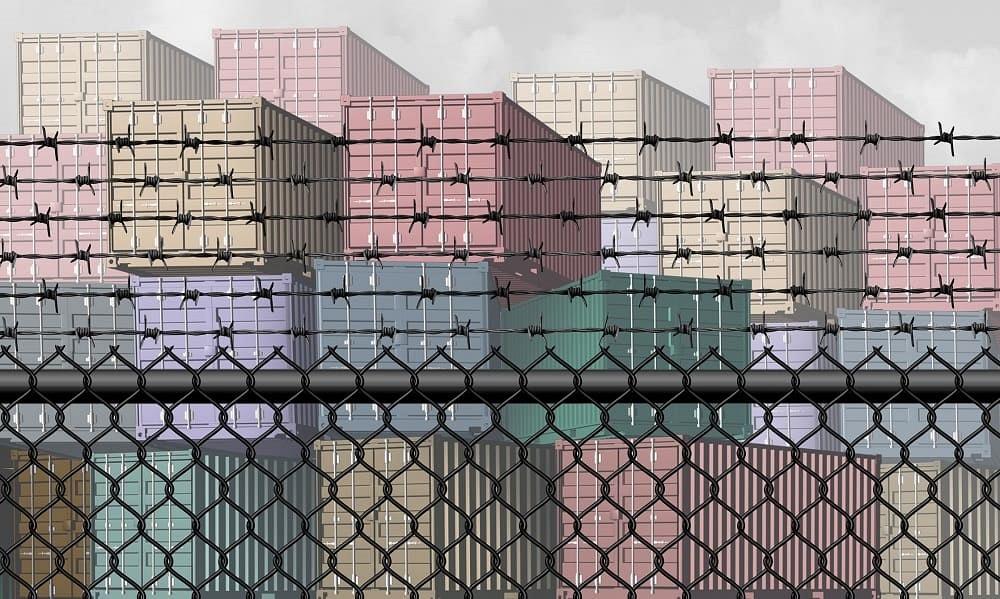Sr. Digital Editor
- FMA
- The Fabricator
- FABTECH
- Canadian Metalworking
Categories
- Additive Manufacturing
- Aluminum Welding
- Arc Welding
- Assembly and Joining
- Automation and Robotics
- Bending and Forming
- Consumables
- Cutting and Weld Prep
- Electric Vehicles
- En Español
- Finishing
- Hydroforming
- Laser Cutting
- Laser Welding
- Machining
- Manufacturing Software
- Materials Handling
- Metals/Materials
- Oxyfuel Cutting
- Plasma Cutting
- Power Tools
- Punching and Other Holemaking
- Roll Forming
- Safety
- Sawing
- Shearing
- Shop Management
- Testing and Measuring
- Tube and Pipe Fabrication
- Tube and Pipe Production
- Waterjet Cutting
Industry Directory
Webcasts
Podcasts
FAB 40
Advertise
Subscribe
Account Login
Search
Trump tweet threatens steel, aluminum tariffs on Brazil, Argentina
- By Gareth Sleger
- December 2, 2019

In another twist to the ongoing trade war, Trump threatens to slap Brazil and Argentina with steel and aluminum tariffs in a tweet Monday morning. Getty Images
December has rolled in with a fresh twist to the on-going trade war for the U.S. steel market.
In the wee morning hours Monday, President Donald Trump once again took to Twitter to announce his administration will “restore” 25 percent steel and 10 percent aluminum tariffs against Brazil and Argentina for what it considers to be currency manipulation.
Trump also demanded that the Federal Reserve lower interest rates to prevent other countries from taking advantage of the strong U.S. dollar.
.....Reserve should likewise act so that countries, of which there are many, no longer take advantage of our strong dollar by further devaluing their currencies. This makes it very hard for our manufactures & farmers to fairly export their goods. Lower Rates & Loosen - Fed!
— Donald J. Trump (@realDonaldTrump) December 2, 2019
While Argentina doesn’t account for much exported steel to the U.S., Brazil is major player in the market.
According to Steel Market Update, Brazil has accounted for an annual average of around 4.8 million tons of exported steel to the U.S. between 2014 and September 2019. Most of that come from slabs, billets, and blooms of semi-finished steel. Argentina, on the other hand, only exported a little more than 186,000 tons of steel to the U.S. in 2018, which was mostly oil country tubular goods (OCTG).
Of course, at this point, Trump’s Tweet can only be classified as a threat and doesn’t hold any water under the law.
"It remains to be seen exactly what the consequences will be," Steel Market Update CEO John Packard said in an email.
But if the Section 232 tariffs go into place, here is what Packard says could happen:
“It will tighten supply and create an environment to support higher steel prices. The steel mills who buy slabs from Brazil are going to potentially have some short term (Q1) supply issues. Those companies who are buying galvanized or Galvalume from Brazil may have to find new sources of supply, probably at much higher pricing.”
There also is a discrepancy over Trump saying he will “restore the tariffs.”
According to an SMU source, trade attorney Lewis Leibowitz, the steel tariff threatened against Brazil and Argentina cannot be technically “restored” since neither country had a 25 percent tariff implemented against them in the first place.
When the steel and aluminum tariffs were first rolled out in Spring of 2018, Brazil and Argentina were two of three countries (South Korea being the other) to negotiate a quota in place of a tariff.
subscribe now

The Fabricator is North America's leading magazine for the metal forming and fabricating industry. The magazine delivers the news, technical articles, and case histories that enable fabricators to do their jobs more efficiently. The Fabricator has served the industry since 1970.
start your free subscriptionAbout the Author

- Stay connected from anywhere

Easily access valuable industry resources now with full access to the digital edition of The Fabricator.

Easily access valuable industry resources now with full access to the digital edition of The Welder.

Easily access valuable industry resources now with full access to the digital edition of The Tube and Pipe Journal.
- Podcasting
- Podcast:
- The Fabricator Podcast
- Published:
- 04/16/2024
- Running Time:
- 63:29
In this episode of The Fabricator Podcast, Caleb Chamberlain, co-founder and CEO of OSH Cut, discusses his company’s...
- Trending Articles
Tips for creating sheet metal tubes with perforations

Supporting the metal fabricating industry through FMA

JM Steel triples capacity for solar energy projects at Pennsylvania facility

Are two heads better than one in fiber laser cutting?

Fabricating favorite childhood memories

- Industry Events
16th Annual Safety Conference
- April 30 - May 1, 2024
- Elgin,
Pipe and Tube Conference
- May 21 - 22, 2024
- Omaha, NE
World-Class Roll Forming Workshop
- June 5 - 6, 2024
- Louisville, KY
Advanced Laser Application Workshop
- June 25 - 27, 2024
- Novi, MI


























